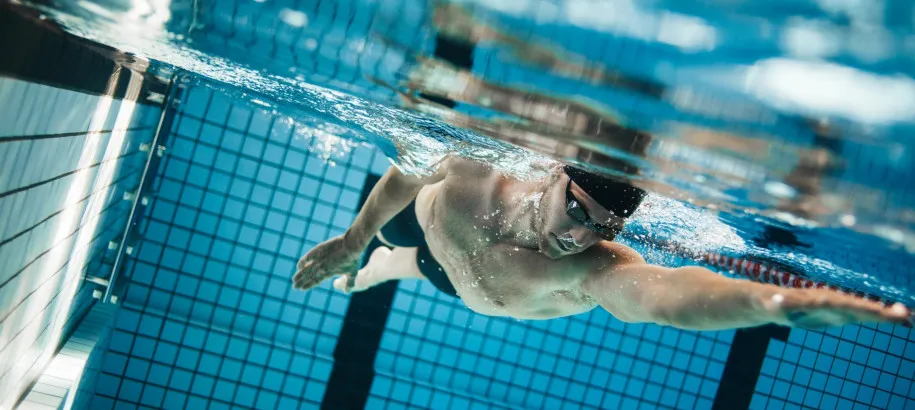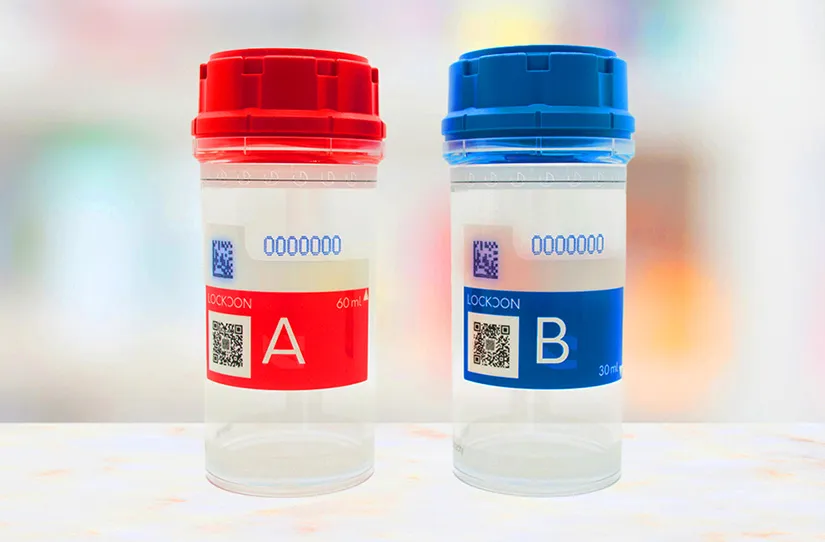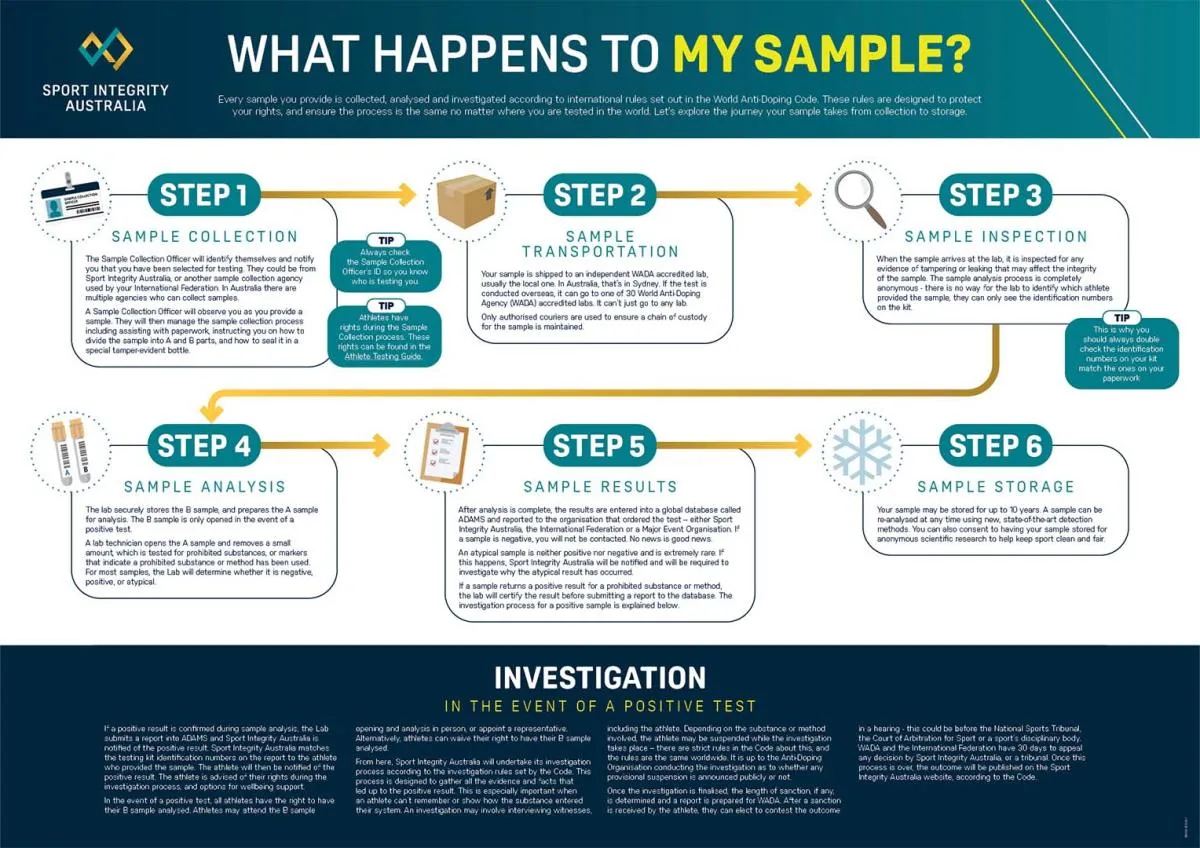The sample collection process is also known as doping control.
We understand that going through the sample collection process can be unnerving, especially if it's your first time.
We are here to support you or you can request a representative.
The doping control process explained
Knowing what happens during and after a testing session is important, below are explainer videos of what to expect for athletes of all abilities.
Athlete rights and responsibilities
As an athlete, you have various rights and responsibilities during the testing process.
Being selected
If you're selected for testing, we'll follow a clear set of rules to ensure the process is consistent and the integrity of the process is maintained. You will be selected by a Doping Control Officer (DCO) and with the assistance of a Chaperone, they will organise and manage the sample collection.
You can be tested in and out of competition.
- In-competition testing takes place either immediately after you've finished competing or at any time during an event or competition.
- Out-of-competition testing can take place at any time of the year and at any location, including your home, training, hotel or when you're overseas.
Once notified of selection for testing, you must remain in direct observation of the DCO or Chaperone until the DCO is satisfied that the sample collection procedure is complete.
Any attempt to evade notification may result in an anti‑doping rule violation (ADRV) and a ban from sport.
Athletes with an impairment
If you have an impairment, you have the right to request a modification to the sample collection process.
Any modifications must be approved by the DCO and will be recorded on the test paperwork.
Doping control staff will work with you and your support personnel to make the process as easy as possible. Be open and honest with the testing staff so they understand what you need to successfully provide and seal your sample.
If you use a catheter and bag, you will be required to drain any urine from the bag prior to the witnessed sample provision. Where possible, you are encouraged to use a clean, sterile catheter. If you choose not to do so, it is at your own risk.
If you require assistance, please advise the DCO or Chaperone.
Anti-doping testing and Ramadan
Under the World Anti-Doping Code, athletes may be selected for sample collection at any time, including during Ramadan.

Athlete representative
All athletes have the right to a representative.
If you are under 18 years of age, you are encouraged to have a representative present while you provide a sample.
The representative will not directly witness you providing the sample, unless you specifically request it.
If an athlete has a disability and requires support, a representative may be present.
Your representative will only directly witness the sample collection if their assistance is needed to help provide the sample or if you request it.
Providing a sample
Urine sample
- Choose a collection vessel, check that it is intact and has not been tampered with.
- You will provide your urine sample in direct view of a Chaperone or DCO of the same gender. They must see your urine sample leaving your body and going into the collection vessel. This may require the removal of any clothing from the knees to the mid-torso and from the hands to the elbows.
- You are responsible for controlling your sample and keeping it in view of the DCO or Chaperone until it is sealed in a sample collection kit.
- If you do not provide the required amount, you will be required to temporarily seal it and provide further volume.
Remember the first urine sample(s) that you provide post notification must be collected.
Blood sample
- You'll be asked to select blood collection equipment and check that it is intact and has not been tampered with.
- You'll need to rest for at least 10 minutes before collection, in some instances, you may be required to wait 2 hours after training or competition.
- A blood collection official will collect the sample in the presence of a DCO and, if applicable, the athlete’s representative.
- As with all blood donations we recommend avoiding strenuous exercise using the arm used for donation for at least 30 minutes This helps minimise bruising at the puncture site.
Finalising the process
You’ll be asked to select a sealed sample collection kit that is intact and shows no signs of tampering. Once opened, you’ll check the sample code numbers on the bottles, lids, and containers all match. These numbers will be recorded on the Doping Control Test Form.
When you provide a urine sample, you’ll be instructed to pour a measured amount of the urine into the ‘B’ bottle first, followed by the ‘A’ bottle. You’ll then seal both bottles to secure the sample. You or the Doping Control Officer will place the sealed bottles into plastic bags and then into a cardboard transport box.
Your personal details, including contact information, will be recorded on the Doping Control Form. You’ll also be asked to declare any medications or supplements you’ve taken in the past 7 days.
At the end of the session, the form will be signed by everyone present, including the Chaperone, athlete representative, Blood Collection Officer and other officials. Signing confirms the information provided is true and accurate.
You’ll receive an electronic copy of the Doping Control Form via email.
All urine and blood samples, along with a de-identified copy of the form, will be sent to a World Anti-Doping Agency (WADA) accredited laboratory for analysis or storage for future analysis.


